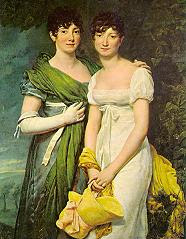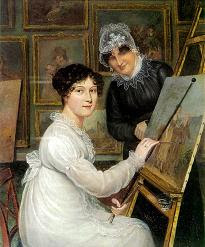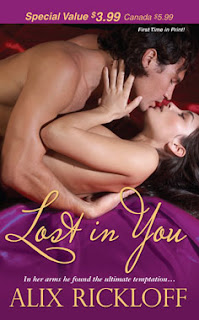 The Riskies welcome debut author Alix Rickloff whose first book came out this August. I’ve known Alix for several years, beginning when she joined Washington Romance Writers. It has been a great delight to see her travel the path to publication. Ah, Alix, I knew you when….
The Riskies welcome debut author Alix Rickloff whose first book came out this August. I’ve known Alix for several years, beginning when she joined Washington Romance Writers. It has been a great delight to see her travel the path to publication. Ah, Alix, I knew you when….
Alix will give away one signed copy of Lost in You to a lucky commenter who will be chosen at random, so be sure to leave a comment. The winner will be chosen by noon Monday Sept 22 and announced here on the blog.
 1. First of all, Alix, tell us about your debut novel, Lost in You. I know it has “something other” than your typical Regency Historical.
1. First of all, Alix, tell us about your debut novel, Lost in You. I know it has “something other” than your typical Regency Historical.
Definitely not your typical Regency Historical! With Lost In You—released at the beginning of August—I introduce you to the world of Other, humans bearing the blood of the Fey and Mortal worlds. Living among the Regency bucks and Society dames of Regency England, these men and women have to try and fit into the human everyday world they inhabit while dealing with the shadowy realm of the Fey who tend to make their cunning and sometimes dangerous presence known all too often.
In this book, Conor Bligh is a soldier belonging to a brotherhood bound together to guard and protect the divide between the Faery and Mortal worlds. When a demon is released from the reliquary that serves as his eternal prison, the task of capturing him falls to Conor.
Ellery Reskeen is an army brat who’s just found out she’s the only one with the power to imprison the demon. What she doesn’t realize is that doing it will cost her life. And that the man she thinks is charged with her protection is actually the one sent to sacrifice her.
It’s got magic and action and messy family relationships and even a crazy aunt in the attic. A little “something other” for everyone!
Sorry, couldn’t help myself.
From Publishers Weekly: I like paranormal historical romance, and Lost in You kept me involved to the end. It has strong characters, warm family relationships, and just the right touch of elusive fae magic.– Joysann
2. Tell us how you came up with the idea for Lost in You.
I’d been writing straight Regency Historicals and had completed four manuscripts, the last with a hint of a paranormal twist. But for whatever reason, none had sold. I decided I wanted to try something completely different. Something that would combine the best of the regencies and the paranormals I loved to read. With Lost In You, I created an alternate universe of men and women who bear the blood of two worlds. I called them my Regency super-heroes. And they were such a blast to write, I knew I’d stumbled onto a good thing. I also decided I wanted an inner conflict for my hero that seemed insurmountable. What’s more insurmountable than knowing you either have to kill the woman you’re falling in love with or see the world destroyed? Talk about a tough decision!
From Romantic Times: Rickloff’s debut sweeps readers into a dark, dangerous and sensual realm where legend and passion mix to perfection to create a compelling, original love story.
3. This is your debut book! Tell us about your writing journey and about getting “The Call.”
I’ve been writing for as long as I can remember. My mother still has stories I wrote and illustrated in the fourth grade. And I read voraciously. Mysteries. Sci-fi. Fantasy. Historical fiction. Romance. But the stories I loved best all had that happy ending and the hero and heroine together at the end. It took until after college for me to realize the stories I wrote tended to fall into that same romance genre. And even then, I fought it. It took joining RWA for the light bulb to go off, and I understood that I couldn’t write any other kind of story. That’s when I finally embraced my inner romantic.
By the time I got the “Call” I’d written four Regency manuscripts, the last finalling in the 2007 Golden Heart contest, although sadly not picked up by any editor. Luckily, while I’d been waiting to hear back, I’d finished up the manuscript that would eventually become Lost In You.
Now I’m a complete mess when it comes to explaining a plot so that it makes sense, so when I initially pitched the idea for Lost In You to my agent, she sounded less than convinced. But once we talked it over and she read the story, she was as excited as I was to find it a home. Last September she called to say that Kensington had made an offer to buy the manuscript for their debut author program. Having pitched to Kate Duffy and heard her speak many times, I was thrilled to get an opportunity to be a part of the K family. It’s been a crazy, fun-filled, anxiety-ridden ride since, but I wouldn’t change it for the world!
4. What were the research challenges for Lost in You? Did you research faeries or did you make up that world?
It’s funny, but I think I worry more over getting the Regency-era details correct than anything else, and I spend countless hours at the editing stage, trying to double-check those facts. The fantasy aspect of the book is my own soup of Celtic legend and fairy lore. I pull from all kinds of sources and as long as I get the basics right, I feel free to spin out in infinite directions and really create my own magical universe. The trick now that I’m three books into the series is keeping it consistent, so in that regard, I’ve begun trying to catalogue what I’ve done in the past so I don’t contradict myself and pull the reader out of the story with a “huh?” moment.
5. What do you think was risky about your book?
 When I sat down to start Lost In You, I pondered the question: what can I do to shake it up? To make this book something completely different? And aside from adding such a wild new element to a genre as cherished as the Regency, my largest concern became the way I interpret that genre.
When I sat down to start Lost In You, I pondered the question: what can I do to shake it up? To make this book something completely different? And aside from adding such a wild new element to a genre as cherished as the Regency, my largest concern became the way I interpret that genre.
I’m a get-in and get-out kind of historical writer. I paint my period with broad brushstrokes, giving the reader what he or she needs to know to embrace the time period, but I’m not going to bog down on the lace of her gown or the intricacies of cravat folding. You’ll just have to assume her lace is lacy and he knows exactly how to tie a Mathematical that would make Beau Brummel proud.
I also tend to flex the language of the time period. Etymology is correct, and I edit as best I can for any anachronisms, but I let my characters speak in a more modern tongue that might cause some readers to cringe. I tried fighting this urge, but as the words flowed onto the page, the story began to take a shape of its own making, and I finally gave up trying to shove my characters back into their 19th century-speak and let them have free rein.
Hopefully this doesn’t turn off readers of traditional regencies, but actually lets them see that the genre can be pulled in a lot of different directions without losing what we all love about it.
6. What is next from you?
I continue the series begun in Lost In You with a second book coming out in July 09. Until I Found You centers on Morgan Bligh, Conor’s cousin whom we first met in Lost In You, but who gets a story of her own when she’s paired with ex-assassin and ex-lover Cam Sinclair. And finally this week, I typed “The End” on my latest manuscript. I’m now in the editing process while mulling over ideas for where I want to go from here.
If things work out, there are two characters from Until I Found You that I’d love to showcase in their own book. But I also have some ideas for a new series that would introduce some fresh faces.
So many of them are clamoring for their own stories that—fingers crossed—I hope I’m able to stick with them for a good long while yet.
Thank you so much for inviting me to chat with you all. This has been wonderful!
♥♥♥♥♥♥♥♥♥♥♥♥♥♥♥♥♥♥♥♥♥♥♥♥♥♥♥♥♥♥♥♥♥♥♥♥♥♥♥♥♥♥♥♥♥♥♥♥♥♥♥♥♥♥♥♥♥♥♥♥♥
Come and say hi to Alix and ask her more. Remember, you could win a signed copy of Lost in You
 Megan’s post about Ridiculous Teenagers got me thinking about a related aspect of Regency heroines. Along with a trend toward somewhat older heroines, there’s also a trend toward more sexually experienced ones. For instance, I’m noticing more widow and courtesan stories. But even among unmarried heroines, there are fewer of the old-style naïve virgin.
Megan’s post about Ridiculous Teenagers got me thinking about a related aspect of Regency heroines. Along with a trend toward somewhat older heroines, there’s also a trend toward more sexually experienced ones. For instance, I’m noticing more widow and courtesan stories. But even among unmarried heroines, there are fewer of the old-style naïve virgin. Just because Regency misses were not supposed to know anything about sex doesn’t make me think that was always true. There probably were some who were so closely chaperoned and secluded that they had no opportunity to figure things out. I could buy that in a story, based on the author’s setup, and I wouldn’t despise a heroine just for being ignorant (we all were once). But I also don’t like to equate “ignorant” with “innocent”.
Just because Regency misses were not supposed to know anything about sex doesn’t make me think that was always true. There probably were some who were so closely chaperoned and secluded that they had no opportunity to figure things out. I could buy that in a story, based on the author’s setup, and I wouldn’t despise a heroine just for being ignorant (we all were once). But I also don’t like to equate “ignorant” with “innocent”. Moreover, if the lady had many sisters, or a large circle of friends, and especially if she went to a girls’ boarding school, I’d bet that at some point she might hear something from someone who heard it from someone else. Of course, the knowledge a heroine gets some of these ways might still be incomplete or incorrect—which could be interesting story fodder!
Moreover, if the lady had many sisters, or a large circle of friends, and especially if she went to a girls’ boarding school, I’d bet that at some point she might hear something from someone who heard it from someone else. Of course, the knowledge a heroine gets some of these ways might still be incomplete or incorrect—which could be interesting story fodder! I could also imagine that if the heroine were raised in an eccentric, bohemian, liberal sort of family, she might know things that most didn’t. We also don’t know what mothers (or older sisters, or married friends) might have told a young bride-to-be. They might have told her to “think of England” but what if the friend or relative was herself the heroine of an earlier romance? What kind of advice might she give?
I could also imagine that if the heroine were raised in an eccentric, bohemian, liberal sort of family, she might know things that most didn’t. We also don’t know what mothers (or older sisters, or married friends) might have told a young bride-to-be. They might have told her to “think of England” but what if the friend or relative was herself the heroine of an earlier romance? What kind of advice might she give?








